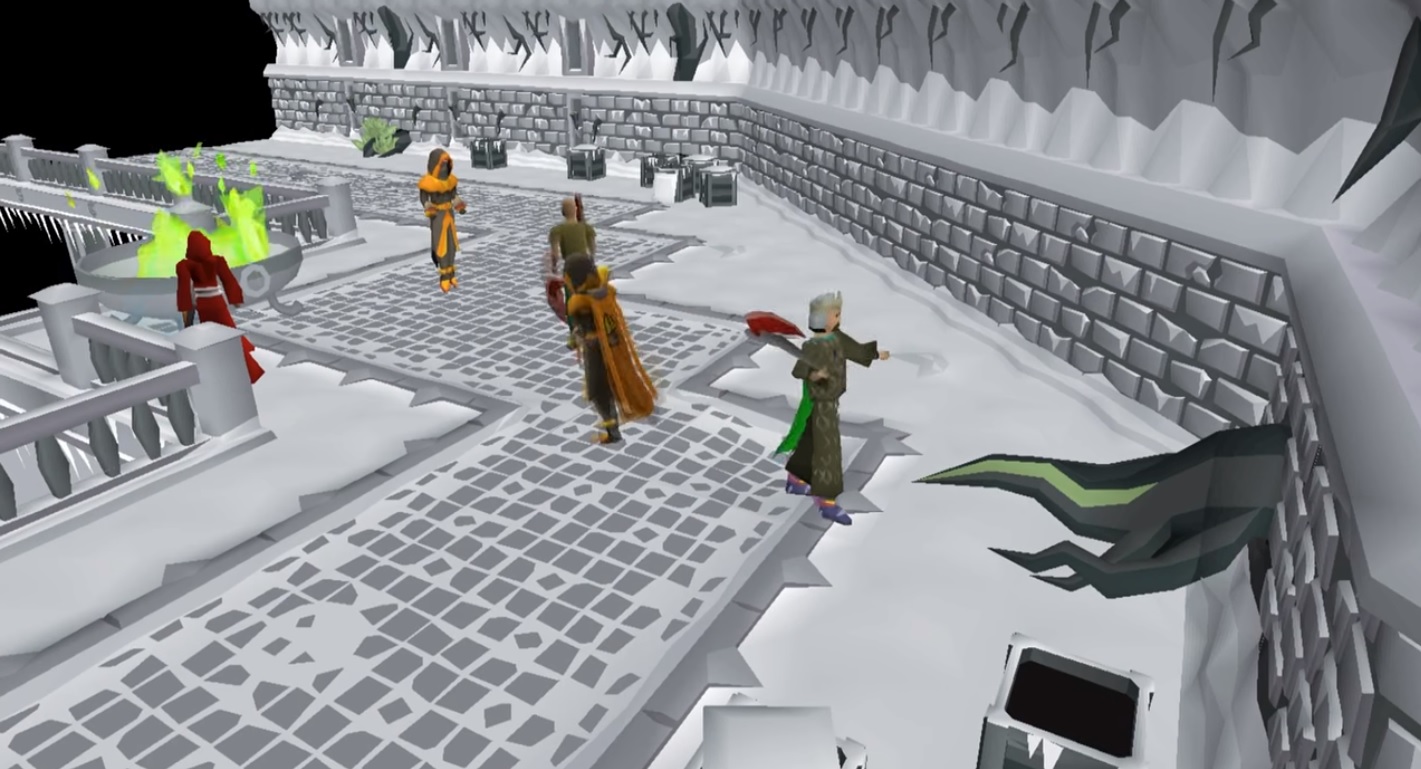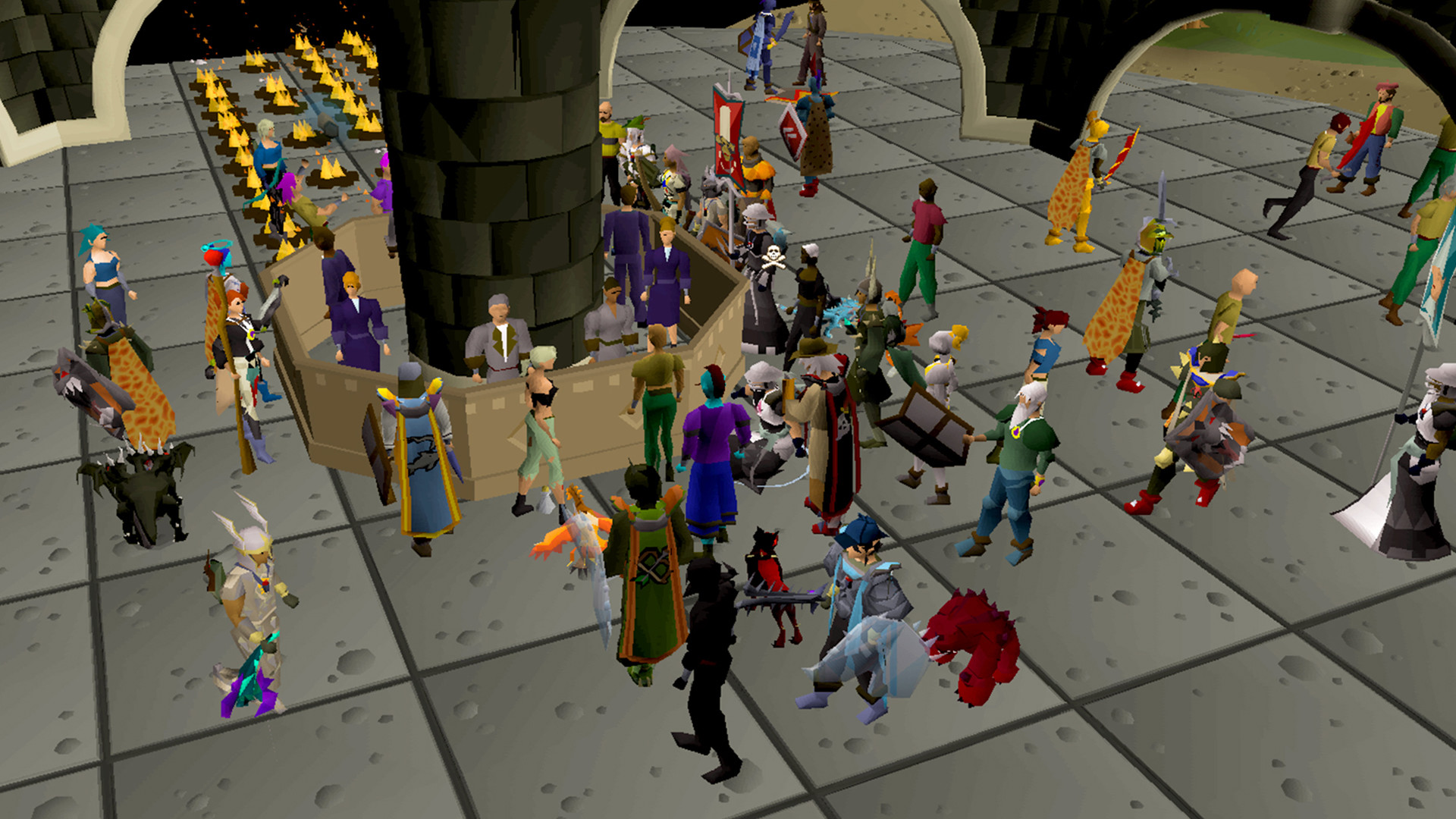Our Verdict
Old School RuneScape is a massive but compelling time sink, and even after all these years, there's simply nothing else like it.
PC Gamer's got your back
This review was originally published in May 2018, and has been republished in conjunction with Old School RuneScape's 2021 Steam release. RuneScape was previously reviewed in the PC Gamer UK October 2009 issue, where it received a 72%.
What is it? A sandbox MMORPG that originally released in 2013, and is based on RuneScape as it was in 2007.
Expect to pay: Free-to-play, $10.99/month for full access
Developer: Jagex
Publisher: Jagex
Reviewed on: Windows 7, i5-3570k, 16GB Ram, GTX 1070
Multiplayer: Massively multiplayer
Link: Official site
Play: Steam
Most MMOs lead you on a campaign that introduces the most important characters, areas and activities, and only then do they take the leash off and tell you to do whatever you want. That last bit is where Old School RuneScape starts. It's a sandbox MMORPG that's deliberately grindy and intimidatingly hands-off. You go through a five-minute tutorial which teaches you the absolute bare minimum and then you're unceremoniously dropped into the hometown of Lumbridge. It's the kind of game where you have to bookmark the wiki before you can get anywhere. But if you're willing to push through the harsh learning curve, and if you find RuneScape's freewheeling sense of adventure liberating rather than overwhelming, you may well find your forever game.
Part of the reason Old School RuneScape is so bad at explaining itself comes down to its heritage. A decade ago, there was no Old School RuneScape. There was just RuneScape. But after a major update totally overhauled RuneScape and turned it into what is now colloquially known as RuneScape 3, Jagex ran a poll to see if players wanted independent servers where they could play RuneScape as it was back in the day. Nearly 500,000 people said yes, and Old School RuneScape was born. So, the threadbare tutorial is more than enough for people who've played RuneScape before (like myself). That said, Old School could still stand to guide new players a bit better, because it's totally unlike other MMOs.
For starters, there are no classes, only skills. Everyone has the same 23 skills, which can broadly be grouped into combat skills like Strength and Ranged, crafting skills like Herblore and Fletching, and gathering skills like Fishing and Mining. All skills start at level one and go up to 99 as you gain experience by dealing damage, crafting potions, catching fish and so on. In other words, you are not a mage, you have high Magic. You're not a warrior, you have high Attack, Strength, and Defence. Your skills reflect your playstyle, but there isn't a hard division between character types. Everyone is encouraged to level all of their skills, and the end goal for most players is to get all of them to 99.
Old School RuneScape also doesn't play like most MMOs. It lacks the customary array of skill bars, hotkeys and cooldowns. It feels more like an old cRPG. It's presented in simple, literal terms, and it's almost entirely mouse-operated. The world is laid out on a grid, and to move your character, you click on the square you want to move to. To talk to an NPC, you click their "Talk to" option. To attack a monster, you click on its "Attack" option. You can do almost everything without touching your keyboard, though it's much easier to play once you set up a few shortcuts.
A recipe for success
From its low-poly graphics to its point-and-click interface, Old School is about as barebones as it gets, but simplicity isn't necessarily a bad thing. There's no fat on RuneScape, and it works because, more than anything, it's a game about setting and reaching goals. It's about improving your account by reaching the finish lines you set for yourself, whether that's earning enough money to buy an expensive item or training a skill to 99. You decide what you want to do, and with every milestone you hit, you unlock new things to do. It's a hugely engrossing cycle for the right kind of player, but it's not always a fun one.
I went into Old School with a clear short-term goal in mind: complete Recipe for Disaster, RuneScape's most difficult and famous quest. To do this, I'd have to complete dozens of other quests and train multiple skills to decent levels, making it a great way to see a lot of the game in a short time. For new players, it's also the best way to learn how RuneScape handles quests.
I was always looking forward to my next opportunity to be a smartass.
There's no defined campaign or main storyline in RuneScape. Instead, its world is fleshed out through quests which are structured like short stories. RuneScape's quests aren't disposable tasks like the fetch quests you pick up from random NPCs in many MMOs—at least, most of them aren't. They're loaded with branching dialogue, unique puzzles and endearingly janky cutscenes. In one quest, by constructing a research tower I unwittingly helped a bunch of researchers create a homunculus, and then I had to calm the confused, malformed being I'd helped create. In another, I uncovered a fraudulent plague that a king had used to quarantine half his kingdom in order to cover up some demonic dealings. Recipe for Disaster is about rescuing committee members from the Culinaromancer, a powerful food wizard, by feeding them their preferred dish.
I remember idly spam-clicking my way through quests as a teenager, but I made sure to read all the dialogue this time around. I'm glad I did, because RuneScape is a very funny game. It's got a wonderful, dry British humor to it, and it's not afraid to be silly. In one day, I helped King Arthur and his knights (who were on holiday in RuneScape) recover the holy grail, infiltrated a monkey kingdom by disguising myself as a gorilla, and helped bickering goblin leaders pick out a new wardrobe for their tribe.
I especially love the way quests write your character. It's funny seeing your avatar react wildly when you choose a relatively tame dialogue option. After an immortal gypsy explained that the whole universe would implode if I didn't complete a quest, my character exclaimed "Not the whole universe! That's where I keep my stuff!" If you mess up a conversation you can just try it again, so I said every line available whenever possible just to watch different conversations play out.
One of my favorite quests is One Small Favor, which is basically a string of fetch quests during which every person you ask to help with something in turn asks you to help with something else. This continues until you have a laundry list of favors to cash in, and after the fifth or sixth request, your character is absolutely fuming. "Oh let me guess," my avatar hissed as the umpteenth NPC stammered something about a missing whatchamacallit. If I wasn't eager to read along, One Small Favor would have bored me to tears, but I was always looking forward to my next opportunity to be a smartass.
Shipping out
Before I could start my saga, however, I needed to make money and purchase some basic supplies. My shopping list included potions to boost my skills, food to recover my health, accessories to teleport to important locations, and magic stones called runes which are used to fuel spells, most notably handy teleport spells. I decided to earn money by training Hunter, one of RuneScape's newest skills. The basics of Hunter are simple: you set traps to catch little NPC critters and then harvest their carcasses for resources. It's one of the most life sim-like skills, and developing it was enjoyable for all the little subgoals involved.
From start to finish, I spent around 20 hours hunting, and by the end I had a tidy cash pile to fund my questing and training. It was a long grind that took me a few days, but I enjoyed Hunter because I used different methods and visited several areas. I started off snaring birds in the south, then moved onto butterflies and hedgehog-like creatures called kebbits in northern plains, until I could finally hunt little explosive raccoons called chinchompas, which are highly prized on RuneScape's auction house, the Grand Exchange. As my Hunter level increased, I needed to earn more and more experience to get to the next level, so I looked forward to unlocking new, faster ways to train, like going from grey to red chinchompas.
Mastering chinchompas was especially interesting because I chose to hunt using a form of animation cancelling called three-ticking. I'll spare you the specifics—just know that by putting in more effort and getting some timing down, you can shorten the time it takes to complete certain actions by tricking the game engine into overriding a long animation with a short one. Old School RuneScape is still using the same engine from 11 years ago, and this animation trick is just one of many ways players have pushed it to its limits. Veteran players have figured out how to do all kinds of things Jagex never really planned on, from shortening animations to cheesing AI.
I spent more time on Hunter than any other skills, but they all follow roughly the same pattern. They're like a tug-of-war with the game itself: as levels start to require more experience, you learn more effective ways to train. As grindy as RuneScape is, as long as you feel like you're roughly keeping up with the ever-lengthening EXP bar, and as long as you have a clear goal in sight, it's never too daunting. But many skills plateau disappointingly early on. The defibrillating shock of unlocking a new training method becomes painfully infrequent. I know from experience that it only gets worse when skills reach the 90s, where a single level can take dozens of hours of the same activity. The EXP bar keeps getting bigger but there's nothing new to do in sight, which is where leveling skills starts to get dull.
I found the crafting skills particularly tedious. To train Herblore, for instance, you withdraw inventory after inventory of herbs and water from your storage, then you just watch your character combine them. It's a slow process which never meaningfully changes, because unlike laying different traps in Hunter, no matter what potion you're making, you're always doing the same thing. These kinds of skills are at their worst when you're losing money on the deal. They feel like a second job you have to pay for. Some other skills, like Agility, feel incongruous. Agility lets you access time-saving shortcuts around the world, but you train it by running circles around rote obstacle courses. Agility is dynamic and helpful in action, but training it is a chore that's totally divorced from what you actually use the skill for.
I want to see more skills follow the model of my favorite skill, Slayer, which is about killing monsters assigned by Slayer masters. Slayer makes training your combat skills more fun by taking you all over RuneScape, and because it makes you fight so many different monsters, you receive item drops which fuel a variety of non-combat skills—gems for Crafting, seeds for Farming, metal bars for Smithing. I would love to see that kind of diversity come to skills like Herblore and Agility, and I want to see more skills interact with other skills, like the way I trained Woodcutting while leveling Hunter. Efficiency is fun, and RuneScape is at its best when you're not stuck doing one thing.
New tricks
Over the years Jagex has managed to wring surprising complexity out of Runescape's basic combat system
Thankfully, some of Old School RuneScape's more recent updates introduced minigames that help liven up otherwise boring skills like Cooking and Firemaking. And while some skills are still dull to train, they're at least more worthwhile thanks to the addition of skill-gated regional diaries which give you a globetrotting to-do list—kill this monster, talk to this NPC, complete this quest, craft this item and so on. Completing diaries unlocks incredibly useful utilities and shortcuts, so they motivate you to train skills and complete quests. They also offer a small but precious dose of direction: if you need a new goal, you can always work on your diaries.
Like diaries, new game modes also encourage players to train their skills. I said earlier that there are no classes in RuneScape, and there aren't, but there are two different account types: normal accounts and ironman accounts. If you play on a normal account, you can do whatever you want, but if you're an ironman, you can't trade with other players, meaning you have to earn and craft all your items yourself. This makes RuneScape much more demanding, but it also amps up the payoff of getting things done. As such, it's rapidly becoming the most popular way to play. True devotees can raise the difficulty further by playing as hardcore ironmen, who are demoted to normal ironmen and kicked off the hardcore leaderboards if they die even once, or ultimate ironmen, who can't store their items and have to carry everything on them at all times.

In the same vein, over the years Jagex has managed to wring surprising complexity out of RuneScape's basic combat system. I was able to sample a few of the latest endgame bosses, and even with best-in-slot gear, they weren't easy to take down. Most bosses have a timer you can use to race yourself, and my times were abysmal. Swapping attack styles mid-fight requires considerable coordination, and knowledge of boss attack patterns is essential to clean kills. Suffice it to say, merely clicking "Attack" doesn't cut it at high levels.
Playing Old School RuneScape is like restoring an old car. It's not always fun, it's often hard work, and most people don't know why the hell you would even bother. But it's damn satisfying to step back and see how your efforts have paid off. It still has a bad habit of abruptly slamming the brakes, and it is most definitely not a game for everyone—even by the standards of MMOs—but there's a reason nearly 500,000 people demanded Old School RuneScape's return. It's still one of the best and biggest sandbox MMOs around, and it's only gotten better with age.
Old School RuneScape is a massive but compelling time sink, and even after all these years, there's simply nothing else like it.

Austin freelanced for PC Gamer, Eurogamer, IGN, Sports Illustrated, and more while finishing his journalism degree, and has been a full-time writer at PC Gamer's sister publication GamesRadar+ since 2019. They've yet to realize that his position as a staff writer is just a cover-up for his career-spanning Destiny column, and he's kept the ruse going with a focus on news, the occasional feature, and as much Genshin Impact as he can get away with.


